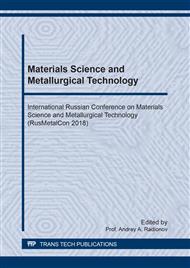[1]
Information on http://www.nrpb.org.
Google Scholar
[2]
S. Kandel, ELF policies worldwide – protection of general public, WHO Workshop (2007).
Google Scholar
[3]
J. Füzi, A. Iványi, Zs. Szabó, Magnetic force computation with hysteresis, J. Magn. Magn. Mater. 237 (2003) 254–255.
Google Scholar
[4]
D. Bavastro, A. Canova, L. Giaccone, M. Manca, Fast magnetic field modeling for shielding systems, Electric Power Systems Research 116 (2014) 374.
DOI: 10.1016/j.epsr.2014.07.004
Google Scholar
[5]
L. Hasselgren, J. Luomi, Geometrical aspects of magnetic shielding at extremely low-frequencies, IEEE Trans. Electromagn. Compat. 37 (1995) 409–420.
DOI: 10.1109/15.406530
Google Scholar
[6]
O. Bottauscio, M. Chiampi, D. Chiarabaglio, F. Fiorillo, L. Rocchino, M. Zucca, Role of magnetic materials in power frequency shielding: numerical analysis and experiments, IEE Proceedings of Generation, Transmission and Distribution, 148 (2001) 104–110.
DOI: 10.1049/ip-gtd:20010162
Google Scholar
[7]
A.V. Trukhanov, S.S. Grabchikov, A.A. Solobai, D.I. Tishkevich, S.V. Trukhanov, E.L. Trukhanova, AC and DC-shielding properties for the Ni80Fe20/Cu film structures Journ. of Magn. And Magn. Matterials 443 (2017) 142-148.
DOI: 10.1016/j.jmmm.2017.07.053
Google Scholar
[8]
A.T. Morchenko, L.V. Panina, V.S. Larin, M.N. Churyukanova, M.M. Salem, H. Hashim, A.V. Trukhanov, V.V. Korovushkin, V.G. Kostishyn, Structural and magnetic transformations in amorphous ferromagnetic microwires during thermomagnetic treatment under conditions of directional crystallization, Journal of Alloys and Compounds. 698 (2017) 685-691.
DOI: 10.1016/j.jallcom.2016.12.247
Google Scholar
[9]
R. Abdel-Karim, Y. Reda, M. Muhammed, S. El-Raghy, M. Shoeib, Electrodeposition and Characterization of Nanocrystalline Ni-Fe Alloys. Journal of Nanomaterials. 2011 (2011) 2-10.
DOI: 10.1155/2011/519274
Google Scholar
[10]
L. Tiancheng, L. Zhichao, L. Peng, Influence of electroplating conditions on magnetic properties of Fe-36% wt.% Ni alloy film. Rare Metals. 25(2006) 484–488.
DOI: 10.1016/s1001-0521(07)60130-2
Google Scholar
[11]
M. Bedir, O. F. Bakkalo, I. H. Karahan, M. Oztas, A study on electrodeposited NixFe1 − x alloy films, Pramana — Journal of Physics, 66, no. 6 (2006) 1093–1104.
DOI: 10.1007/bf02708462
Google Scholar
[12]
N. Myung, A study on the electrodeposition of NiFe alloy thin films using chronocoulometry and electrochemical quartz crystal microgravimetry, Bull. Korean Chem. 22 (2001), 994-998.
Google Scholar
[13]
M. H. Seo, D. J. Kim, and J. S. Kim, The effects of pH and temperature on Ni-Fe-P alloy electrodeposition from a sulfamate bath and the material properties of the deposits, Thin Solid Films, vol. 489, no. 1-2, p.122–129, (2005).
DOI: 10.1016/j.tsf.2005.05.011
Google Scholar
[14]
P Wai, V Dmitrenko, S Grabchikov, K Vlasik , A Novikov, D Petrenko, А. Trukhanov, S Ulin, Z Uteshev, V Chernysheva, A Shustov, Application peculiarities of magnetic materials for protection from magnetic fields Journal of Physics: Conference Series (International Conference on Particle Physics and Astrophysics (ICPPA-2015)) 675 (2016).
DOI: 10.1088/1742-6596/675/4/042006
Google Scholar
[15]
V. A. Ketsko, E.N. Beresnev, M.A. Kop'eva, L.V. Rjabkova, A.E. Baranchicov, A. I. Stognij, A.V. Trukhanov, N.T. Kuznetsov. Specifics of the pyrohydrolytic and solid-phase syntheses of solid solutions in the (MgGa2O4)X(MgFe2O4)1-X system, Russian Juornal of Inorganic Chemistry, 55 № 3 (2010) 427-429.
DOI: 10.1134/s0036023610030216
Google Scholar
[16]
S. Sam, G. Fortas, A. Guittoum, N. Gabouze, and S. Djebbar, Electrodeposition of NiFe films on Si(1 0 0) substrate, Surface Science, 601 № 18 (2007) 4270–4273.
DOI: 10.1016/j.susc.2007.04.107
Google Scholar
[17]
P. Fricoteaux, C. Rousse, Influence of substrate, pH and magnetic field onto composition and current efficiency of electrodeposited Ni-Fe alloys, Journal of Electroanalytical Chemistry, 612 №1 (2008) 9–14.
DOI: 10.1016/j.jelechem.2007.08.022
Google Scholar
[18]
A.V. Trukhanov, S.V. Trukhanov, L.V. Panina, V.G. Kostishyn, I.S. Kazakevich, An.V. Trukhanov, E.L. Trukhanova, V.O. Natarov, V.A. Turchenko, M.M. Salem, A.M. Balagurov, Evolution of structure and magnetic properties for BaFe11.9Al0.1O19 hexaferrite in a wide temperature range, Journ. of Magn. AndMagn. Matterials 426 (2017) 487–496.
DOI: 10.1016/j.jmmm.2016.10.140
Google Scholar
[19]
M. M. Ahadian, A. I. zad, E. Nouri, M. Ranjbar, A. Dolati, Diffusion and segregation of substrate copper in electrodeposited Ni-Fe thin films, Journal of Alloys and Compounds, 443, №1-2 (2007) 81–86.
DOI: 10.1016/j.jallcom.2006.10.048
Google Scholar
[20]
Z. Zhao, Electrocrystallization nucleation and growth of NiFe alloys on brass substrate, The Transactions of Nonferrous Metals Society of China, 15 №4 (2005) 897–901.
Google Scholar
[21]
D.I. Tishkevich, S.S. Grabchikov, L.S. Tsybulskaya, V.S. Shendyukov, S.S. Perevoznikov, S.V. Trukhanov, E.L. Trukhanova, A.V. Trukhanov, D.A. Vinnik, Electrochemical deposition regimes and critical influence of organic additives on the structure of Bi films, J. of All. And Comp. 735 (2018) 1943-1948.
DOI: 10.1016/j.jallcom.2017.11.329
Google Scholar
[22]
S.S. Grabchikov, L.B. Sosnovskaya, T.E. Sharapa, Multilayer electromagnetic shield. Patent of the Republic of Belarus 11843(2009).
Google Scholar
[23]
E.M. Purcell, Electricity and Magnetism, McGraw Hill, Electricity And Magnetism Purcell, Berkeley Physics Course, 2 (1985).
Google Scholar
[24]
D. Starratt, T.Sanders, E. Cepuš, A. Poursartip, R.Vaziri, An efficient method for continuous measurement of projectile motion in ballistic impact experiments, Elsevie, 24 (2000) 155-170.
DOI: 10.1016/s0734-743x(99)00045-7
Google Scholar
[25]
S.S. Grabchikov, A.V. Trukhanov, S.V. Trukhanov, I.S. Kazakevich, A.A. Solobay, V.T. Erofeenko, N.A. Vasilenkov, O.S. Volkova, A.Shakin, Effectiveness of the magnetostatic shielding by the cylindrical shells, Journ. of Magn. And Magn. Matterials, 398 (2016) 49-53.
DOI: 10.1016/j.jmmm.2015.08.122
Google Scholar


